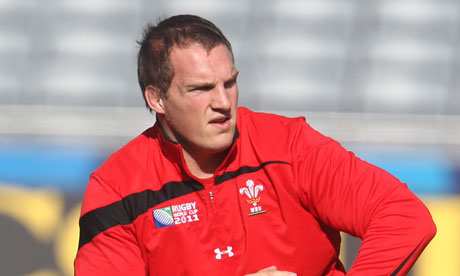
The Australian Rugby Union has awarded a pass mark to the Wallabies for reaching the semi-finals but Wales's feat in reaching the last four will be rewarded with a reception when the squad return home next week.
While both coaches have stressed they regard the play-off, or bronze final as it has been officially tagged befitting rugby union's Olympic status, as a Test match which is no less significant than last weekend's semi-finals, finishing third in a World Cup would mean more to Wales than Australia, as was the case in 1987 when the sides jousted for the consolation prize.
Alan Jones, the Australia coach 24 years ago, was so contemptuous of the concept of a play-off between two sides who had been knocked out of a tournament that he suggested the Wallabies should not bother turning up. They did, lost the flanker David Codey within five minutes for stamping, and went down to a Paul Thorburn conversion in the final minute. They were presented with a Maori carving to mark their fourth place, but left it in the changing room.
It is Wales who should be more piqued this time at having to play two days before the final. They were within a few feet of making the last day only for Leigh Halfpenny's late long-range penalty to dip under the crossbar when it had appeared for most of its flight that it would go over it.
That a side which had played with 14 men for the last 63 minutes felt so anguished in defeat that some of the players struggled to articulate their feelings more than hour after the final whistle said everything about Wales's transformation this tournament from a team that had struggled to back up performances to one worthy of appearing in the final.
Australia stumbled into the semi-finals after surviving a battering from South Africa and found it a step too far. They had, by virtue of losing to Ireland in the group stage, the disadvantage of facing the hosts rather than the fractious French, but seldom has a trans-Tasman tussle tantalised so little.
The Wallabies were blown away at forward: up front, in the lineout and at forward where the All Blacks had devised a strategy to contain David Pocock. The half-backs, Will Genia and Quade Cooper were neutered, and a back division, which even without the injured Kurtley Beale was potent out wide, was largely required for tackling.
Australia arrived in New Zealand as the favourites of many to win the Webb Ellis Cup. They were the Tri-Nations champions and the Reds won the Super 15 but their failing in 2007, a lack of grunt up front, cost them again. Ireland dragged them into a mire of mauls and scrums and South Africa hogged the ball to such an extent that they enjoyed a territory count of 76%Australia's running game ran out of ball. They scored one try in the knockout stage, a rumble by the second-row James Horwill after Schalk Burger had lost possession near his own line. They defended strongly, only one try conceded, and while they have made six changes to their pack for the play-off, including the entire front row, they have picked their most attacking back division, with Berrick Barnes starting at inside-centre.
Wales have picked their strongest available side with their coach Warren Gatland refusing to relax his strict policy on drinking this week. It is weaker than the starting line-up against France because Sam Warburton, the flanker and captain who would have been one of the contenders for the International Rugby Board's player of the year but for his red card against France, is suspended, leaving them without an openside specialist to battle David Pocock, and the prop Adam Jones is injured. With Alun Wyn Jones on the bench because of fatigue, all three areas of the pack have been changed.
They are still without the outside-half Rhys Priestland, whose absence was acutely felt against France, especially towards the end when Wales enjoyed a monopoly of possession without, after Mike Phillips had scored a try with 22 minutes to go, threatening a defence that opted not to contest the breakdown but fanned out across the pitch.
Warburton and Priestland have defined Wales this tournament, young players who are not easily distracted, yet for all the augmented mental strength of the squad and physical conditioning that sets them apart, their progress in the past two months can be measured more in performance than results.
They lost a tight match to South Africa, as they have tended to do for the past three years, and they failed to beat France, as has been the case for four matches in five since 1982. Defeat in the play-off would leave them with a record this World Cup of won four lost three, not the greatest reward for the purpose and ambition they have shown.
One pundit here this week described Wales as an ordinary side, but it is not a view shared by the vast majority of his country folk. One local said how he was flying the Welsh flag from his car along with New Zealand's because he felt that they, more than any other side, deserved a tilt at the All Blacks in the final and he was surprised by how badly he had taken their defeat to France.
That is little consolation to Gatland but with five matches to come against Australia in the next nine months, Wales not only have the chance to take the bronze medal but to get into the top three of the world rankings. Third in the World Cup is one thing, third in the world something better.

